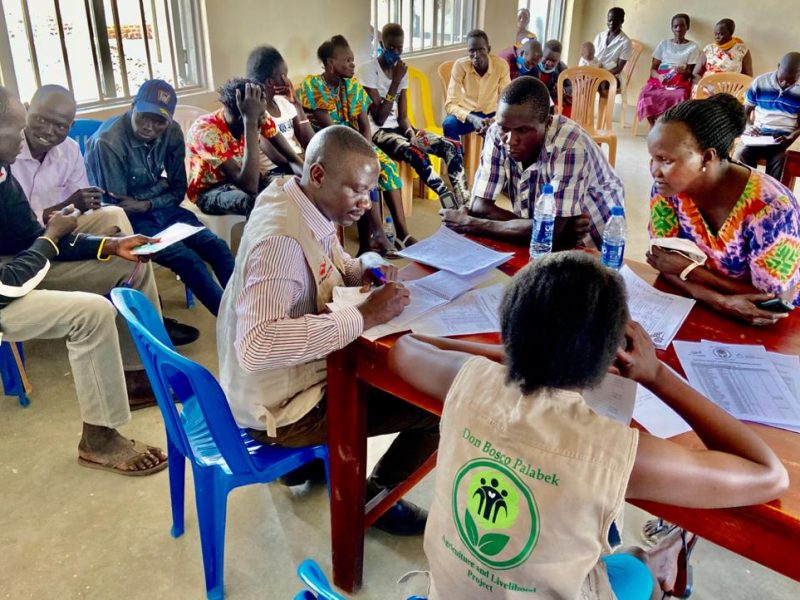This year I wanted to celebrate the World Day of Migrants and Refugees with a Mass
that invites and welcomes you especially who are migrants, refugees and asylum
seekers. Some of you have recently arrived in Italy, others are long-time residents
and work here, and still others make up the so-called “second-generation”.
For everyone in this assembly, the Word of God has resonated and today invites us
to deepen the special call that the Lord addresses to each one of us. As he did with
Samuel (cf 1 Sm 3:3b-10,19), he calls us by name – each one of us – and asks us to
honour the fact that each of us has been created a unique and unrepeatable being,
each different from the others and each with a singular role in the history of the
world. In the Gospel (cf Jn 1:35-42), the two disciples of John ask Jesus, “Where do
you live?” (v. 38), implying that the reply to this question would determine their
judgment upon the master from Nazareth. The response of Jesus is clear: “Come and
see!” (v. 39), and opens up to a personal encounter which requires sufficient time to
welcome, to know and to acknowledge the other.
In the Message for this year’s World Day of Migrants and Refugees I have written,
“Every stranger who knocks at our door is an opportunity for an encounter with Jesus
Christ, who identifies with the welcomed and rejected strangers of every age
(Mt25:35,43).” And for the stranger, the migrant, the refugee, the asylum seeker
and the displaced person, every door in a new land is also an opportunity to encounter
Jesus. His invitation “Come and see!” is addressed today to all of us, to local
communities and to new arrivals. It is an invitation to overcome our fears so as to
encounter the other, to welcome, to know and to acknowledge him or her. It is an
invitation which offers the opportunity to draw near to the other and see where and
how he or she lives. In today’s world, for new arrivals to welcome, to know and to
acknowledge means to know and respect the laws, the culture and the traditions of
the countries that take them in. It even includes understanding their fears and
apprehensions for the future. And for local communities to welcome, to know and to
acknowledge newcomers means to open themselves without prejudices to their rich
diversity, to understand the hopes and potential of the newly arrived as well as their
fears and vulnerabilities.
True encounter with the other does not end with welcome, but involves us all in the
three further actions which I spelled out in the Message for this Day: to protect, to
promote and to integrate. In the true encounter with the neighbour, are we capable
of recognizing Jesus Christ who is asking to be welcomed, protected, promoted and
integrated? As the Gospel parable of the final judgment teaches us: the Lord was
hungry, thirsty, naked, sick, a stranger and in prison — by some he was helped and
by others not (cf Mt 25:31-46). This true encounter with Christ is source of salvation,
a salvation which should be announced and brought to all, as the apostle Andrew
shows us. After revealing to his brother Simon, “We have found the Messiah” (Jn
1:41), Andrew brings him to Jesus so that Simon can have the same experience of
encounter.
It is not easy to enter into another culture, to put oneself in the shoes of people so
different from us, to understand their thoughts and their experiences. As a result we
often refuse to encounter the other and raise barriers to defend ourselves. Local
communities are sometimes afraid that the newly arrived will disturb the established
order, will ‘steal’ something they have long laboured to build up. And the newly
arrived also have fears: they are afraid of confrontation, judgment, discrimination,
failure. These fears are legitimate, based on doubts that are fully comprehensible
from a human point of view. Having doubts and fears is not a sin. The sin is to allow
these fears to determine our responses, to limit our choices, to compromise respect
and generosity, to feed hostility and rejection. The sin is to refuse to encounter the
other, the different, the neighbour, when this is in fact a privileged opportunity to
encounter the Lord.
From this encounter with Jesus present in the poor, the rejected, the refugee, the
asylum seeker, flows our prayer of today. It is a reciprocal prayer: migrants and
refugees pray for local communities, and local communities pray for the newly arrived
and for migrants who have been here longer. To the maternal intercession of Mary
Most Holy we entrust the hopes of all the world’s migrants and refugees and the
aspirations of the communities which welcome them. In this way, responding to the
supreme commandment of charity and love of neighbour, may we all learn to love
the other, the stranger, as ourselves.




